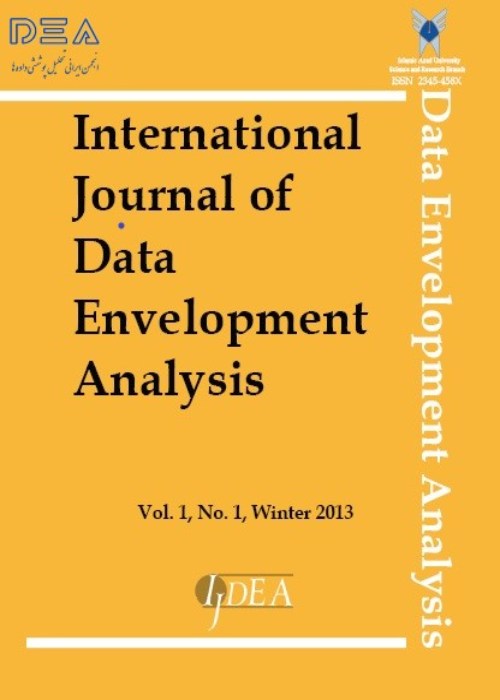فهرست مطالب
International Journal of Data Envelopment Analysis
Volume:8 Issue: 1, Feb 2020
- تاریخ انتشار: 1399/01/01
- تعداد عناوین: 6
-
Pages 1-10Today, in every society the health and treatment sector are among the most important service sectors. Therefore, it is crucial that their performance be evaluated and examined. Although the researchers have proposed many different approaches to evaluate and rank the health sectors, no precise approach for evaluating and ranking have been reported up to now. Assessing the coefficient of variation in data envelopment analysis has been extensively used as an instrument to measure the performance of decision making units and to rank them accordingly. In this study, therefore, the existing approaches were modified and two approaches were developed for interval DEA ranking based on the coefficients of variation with Interval data. These two models having none of the problems of other models, were developed to better comprehend the performance of health and treatment sectors in Iran in 2017. Conducting this study had such positive consequences as the creation of a healthy competitive atmosphere among all the medical universities to improve their performance. Another consequence might be the fact that conducting this study helped the health and treatment sectors in medical universities to be improved.Keywords: Data Envelopment Analysis, Health Efficiency, Evaluation, Ranking, Coefficient of variance
-
Pages 11-19
This paper introduces two virtual Decision Making Units (DMUs) called ideal point and anti-ideal point, Then calculates distances of each DMU to the ideal and anti-ideal point. The two distinctive distances are combined to form a comprehensive index called the relative closeness (RC) just like the TOPSIS approach. The RC index is used as an overall ranking for all the DMUs. Then, this method compares with AP [1], Wang et al. [8], and Wu [9] methods. The proposed method is more simple and better than other methods and also it doesn’t have drawbacks of the previous ranking methods.
Keywords: Ideal point, Anti-ideal point, TOPSIS, The relative closeness (RC) -
Ranking Efficient Decision Making Units in Data Envelopment Analysis based on Changing Reference SetPages 21-26One of the drawbacks of Data Envelopment Analysis (DEA) is the problem of lack of discrimination among efficient Decision Making Units (DMUs). A method for removing this difficulty is called changing reference set proposed by Jahanshahloo and et.al (2007). The method has some drawbacks. In this paper a modified method and new method to overcome this problems are suggested. The main advantage of this method is minimizing coefficient of variation t that has crucial role in ranking efficient DMUs. Numerical example for illustration suggested method are given. To validate new methods, the author compared the obtained result from new suggested method with Norm 1 which is efficient methods for ranking DMus.Keywords: Data Envelopment Analysis, Coefficient of Variation, Efficiency, Changing Reference Set, Ranking
-
Pages 27-37
Performance measurement is always one of the most important tasks of managers, so knowledge management is measurement knowledge, and if we can measure something, we can no doubt control it, and therefore we cannot manage it. In this paper, according to the Malmquist productivity index, an index is used to determine the progress and regress of a unit. This index is defined by the boundary changes resulting from the inputs of the units and their efficiency changes, which we call the Malmquist Productivity Index. After calculating the Malmquist changes, we were able to determine the rate of increase or decrease in the indicators for the following period.
Keywords: Data Envelopment Analysis, Balanced Scorecard, Malmquist Productivity Index -
Pages 39-48Finding the Most Efficient Decision-Making Unit (DMU) provides more information about efficient DMUs in data envelopment analysis (DEA). Hence, in recent years, many mixed-integer linear programming (MILP) models based on a common set of weights have been proposed to determine the most efficient DMU. This paper introduces another MILP model to find the most efficient DMU. In this model, we use a numerical parameter to increase the discrimination power of the proposed model. To illustrate the various potential applications of the proposed model, we compare the performance of our model with the other three models using two real numerical examples.Keywords: Data Envelopment Analysis, The most efficient DMU, Mixed-integer linear programming
-
Pages 49-57
Data envelopment analysis is an efficiency evaluation method for assessing DMUs. In this context, ranking efficient DMUs is very important. So far, various models have been provided for this purpose. According to the results of these methods, can be seen that the rank obtained for each DMU will vary. Due to this issue, we cannot provide a specific method to specify ranking to DM. In order to solve this problem, this paper employs the Rough Set theory to determine the compatibility or incompatibility of these methods together and thus provide the appropriate ranking among the existing methods.
Keywords: Data envelopment analysis (DEA), Ranking, Rough set theory (RST)


